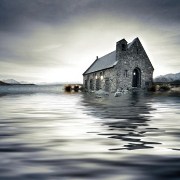 Photo: Getty Images
Photo: Getty Images
Flood waters caused by unusually heavy rain and snow melts are causing devastation through many states this spring. In addition to higher than normal pollen counts, people living in flooded areas need to take extra precautions if they have allergies or asthma. That warning comes from the American College of Allergy, Asthma & Immunology (ACAAI).
Homeowners who are concerned with salvaging damaged belongings may not realize the air quality in a flooded home can make them sick. Whether flooding was caused by rising rivers or overflowing irrigation, moisture and high humidity left behind when flood waters recede can provide the perfect growing environment for molds.
Mold is a fungus that creates seeds called “spores”. Mold can live almost anywhere as long as there is enough moisture to allow for growth. When spores are released into the air, they can be inhaled and cause a reaction in someone who is allergic.
Mold allergy is the result of an inappropriate response by the body’s immune system. When the immune system of someone who is allergic comes in contact with an allergen such as mold, it reacts as though the allergen was a danger to the body. This triggers the release of chemical antibodies designed to fight off the invading particles. As a result, histamine floods the system and causes the sneezing, itching, runny nose, coughing, wheezing, and congestion that are typical of an allergic attack.
One of the biggest allergen concerns in flooded homes is the carpeting. “Carpets should be pulled up and thoroughly dried within the first 24 hours,” said allergist James L. Sublett, M.D., who is the chair of the indoor environments committee for the ACAAI. “The pads cannot be dried out and should be thrown away.”
Wall board is also a concern since damage is often hidden with mold growing unseen on the inside of the board. Sublett recommended that all wallboard that has been wet should be replaced to above the waterline.
The Environmental Protection Agency (EPA) recommends wearing an N-95 respirator when working in a building that has been flooded. The N-95 is a basic face mask that filters at least 95 percent of airborne particles. These masks are available at most home centers and hardware stores. The EPA also suggests wearing goggles, gloves, long pants, long-sleeved shirts, and work shoes during flood water clean-up and recommends that anything that was wet and cannot be cleaned should be thrown away.
Sources:
American College of Allergy, Asthma & Immunology
National Institutes of Health: Medline Plus
Asthma and Allergy Foundation of America
National Institute for Occupational Safety and Health
Reviewed May 19, 2011
Edited by Alison Stanton





Add a CommentComments
There are no comments yet. Be the first one and get the conversation started!